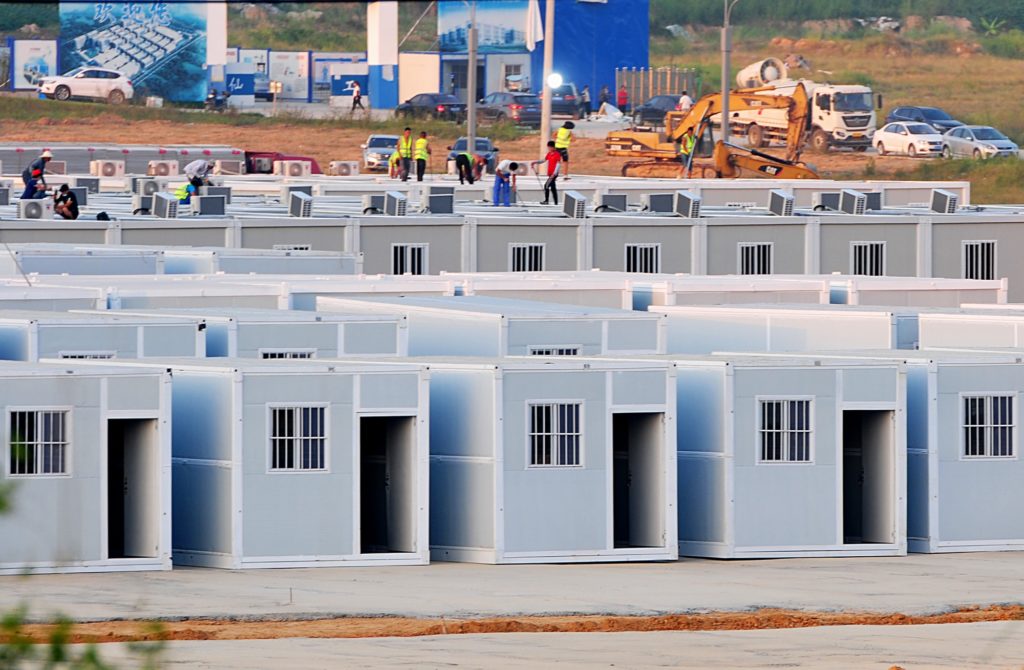
Goodbye Shanghai
I’m writing this in the empty lanehouse apartment in the former French Concession that has been my home since I moved to Shanghai just over three years ago. The words will not come easy. They once did. I used to love this place. But like most things around here, it wasn’t built to last. This morning, the movers came and took all my things away. Tomorrow I will leave this country. I could have never anticipated it ending this way. I will probably never return.
A dramatic statement for sure, and not one I’ve ever uttered about any of the other eight countries I’ve lived in or fifty I’ve traversed in my travels. But since I arrived here to live three years ago, after having been a China visitor for roughly a decade, I’ve watched the situation swiftly devolve from a state of quotidian life that at least implied a certain stagnant normality to a condition of totalitarian unlivability not even Orwell could have prophesied, and that has led certain bold domestic critics to refer sardonically to Xi Jinping’s China as “West Korea.”
If we are looking for a convenient phrase to sum up the current state of affairs, we might lean on Xi’s summation of the country’s supposed response to a public health crisis: the “zero-Covid strategy,” whereby, since China closed its borders in early 2020, the entire bureaucracy and police apparatus have been mobilized so as to prevent a single case of Covid-19 from intruding. One would have supposed that this policy, whose punitive nature was likely a response to the humiliations of Wuhan, would have been revised when the highly contagious yet essentially harmless Omicron variant began to spread in the early months of this year—just as 2022 has seen virtually every other country in the region and the larger world relax its measures in response to a variant that is largely asymptomatic and only rarely results in serious illness. But China is not a normal country, nor is Xi your typical leader with at least vague pretensions of respecting science and consensual notions of what constitutes reason and sanity; he is rather a weak, vulnerable, and insecure dictator whose delusions of grandeur led him, early on in his rise, to eliminate all of his political enemies (and none of his equally corrupt high-powered supporters) via an “anti-corruption campaign” that was deliberately constructed so as to win him superficial admiration from the toiling masses. This was followed in 2018 by a revision of the constitution that did away with term limits for the country’s presidency, effectively reverting the country back to the pre-modern era in enabling Xi to become emperor for life.
With this fall’s upcoming Party Congress that—barring a coup from within—is set to confirm an unprecedented third five-year term for his leadership, Xi’s paranoid insecurities have led him to assume a strongman pose in response to the spread of Omicron and double-down on the “zero-Covid strategy,” enforcing in Shanghai a city-wide lockdown that officially began on April 1st, but, in certain quarters such as my own, actually began in mid-March. The entire city, forbidden to leave their homes, swiftly fell into a brutalizing condition of police state madness—the natural harbinger of a hierarchical political system in which bureaucrats are trained to simply follow orders unthinkingly without any consideration of the consequences of their actions. The results of this were a disaster. I will attempt to enumerate a partial list: widespread food shortages; the inability of those suffering from non-Covid-related illnesses and injuries to access medical treatment, often resulting in debilitation and death; surges in mental health crises and domestic violence; the removal of those who tested positive during the relentless near-daily mass antigen testing to squalid concentration camps—as well as, via the country’s surveillance apparatus that tracks one’s every movement through phone apps, the additional sequestering of those suspected to have come into contact with positive cases; the forced and often violent removal of residents from their homes so that their homes could be turned into quarantine facilities; the killing of quarantined people’s pets, supposedly to prevent the virus’s spread; the separation of quarantined parents from children; the protests that erupted against these conditions that were met with police brutality—and the more people protested, the harsher the repercussions against them from the state; the documentation of all these events on social media and its near-immediate erasure by the authorities, so that even elsewhere in China, let alone the rest of the world, very few were aware of the true extent of the terror… Such occurrences became daily commonplaces in what was once considered to be the mainland’s flashiest and most cosmopolitan and sophisticated city—a city that has rapidly been reduced to a post-apocalyptic hellscape.
Police forcibly removing citizens from their homes to make way for quarantine centers.
It requires a most primitive and anti-humanistic intellect to believe that there is great virtue in never changing your mind, even when the empirical circumstances that informed your original decision have changed (e.g. Covid-19’s latest morphing into Omicron, a variant that is often asymptomatic and no more dangerous than the common cold.) In fact, the delusional thinking behind “zero-Covid,” untethered from the realities of science and public health and completely mired in Xi’s paranoia-fueled political aspirations that have succeeded in completely isolating China from the rest of the world—as well as all the pain, suffering, and death that have resulted from its oppressive and chaotic enforcement over the past three months—is but the latest and ugliest manifestation of the top leadership’s blatant contempt for the lives of its citizens. A man of extremely limited intellectual capability—he is codedly derided on Weibo, as a means of subverting the increasingly intensive censorship mechanisms, as “the Elementary School Student” for his low level of knowledge and cultural sophistication—and even narrower vision for his country which is reflected in policies that he has crafted almost uniquely by himself, Xi offers armchair psychoanalysts a sadly typical case study of the damaged mind of a petty dictator, all too ready to inflict his profound insecurities upon a mass of people virtually powerless to combat it. Having come of age during the blighted decade of the Cultural Revolution (1966-1976)—during which, his few supporters will inevitably point out, his family was also persecuted—these were nonetheless formative years for Xi; now, it is easy for us all to see, he never really left them behind. That era of state-orchestrated chaos, of mass denunciations, of the destruction of books, artworks, and precious architectural and cultural relics, of attacks upon artists and intellectuals and any form of independent thought whatsoever that dared raise its ugly head, of lives pointlessly upended and destroyed en masse—this was the most consequential decade of the twentieth century for China. Without fathoming it, there is simply no way of understanding the country China has since become. Further, there is no better way of understanding the mindset of the person who singlehandedly controls it than by studying the nature of its occurrence and its effects.
The other historical event key to understanding 21st century China is of course the government’s massacre of student protesters that took place on Beijing’s Tiananmen Square on June 4, 1989. Erased from official memory by a strict law that forbids anyone from even discussing it, post-’89 China has nonetheless been governed under an unofficial social pact between the government and the people that goes something like this: We will focus on the economy, improve your standards of daily living, and enable you to get rich, even—but in exchange, you must never, ever again criticize or question the authority of the Chinese Communist Party. This, roughly, is the domestic corollary to the country’s post-Cultural Revolution “Reform and Opening Up” policy that saw China open its doors to the world after years of self-imposed isolation. A policy, nourished by hopes both within and outside of China, that many believed would lead to gradual political liberalization.
And yet Xi has made it increasingly clear that he no longer cares about that policy; that the doors to the outside world are now closed, and that outside world is officially a threat to China’s security and self-interests; that the economy must and will for now on remain subordinate to the Chinese Communist Party and its politics; and that those politics, aided by the new reality of the surveillance state, will only become increasingly repressive, in a word fascist. Under his government, he has wreaked tremendous havoc in the economic sphere. In the eyes of the international business community, China is no longer investable—the risks of losing your shirt due to arbitrary government policies have simply become too real. Numerous international corporations have begun to move their Asian base of operations out of Shanghai, and out of China altogether—following a similar move by all those outfits once rooted in Hong Kong.

The artists and intellectuals are doing the same. As I write this, almost every single one of my close friends and colleagues has left China—easier for foreigners, but more difficult for my friends with Chinese passports, as the government—perhaps fearing the inevitable brain drain—has made it increasingly impossible for its citizens to leave the country, again under the pretext of Covid-19, giving further rise to a feeling of widespread desperation and panic. I will be among the last of our little crew to leave, and it wasn’t the easiest decision to arrive at. I landed here in 2019 with a certain naïve optimism of starting a new chapter in my life. But I arrived in a very different place than the one Shanghai has become, one that at least bore the remnants of its former joyful free-thinking decadence.
When the Shanghai lockdown “ended” on June 1st, it became immediately clear to us that we were merely being released into an expanded version of the government’s system of surveillance terrorism. Testing sites have been set up throughout the city, and we are required to get tested every seventy-two hours, at which point we scan our phones’ green QR codes. We also have to scan those codes in order to enter most buildings. If we fail to get tested every seventy-two hours, the code might turn yellow or red, which is very bad for you; in any case, it is indicated beneath your green QR code when you were last tested, and if it falls outside of the 72 hour timeframe, you might be refused entrance. These scannings are the government’s way of doing contact tracing, which has already resulted in targeted lockdowns and forced internments in the Covid camps, which are still open. Within a day of enjoying our “freedom,” there were already rumors of entire compounds being shut down because of someone’s exposure to a positive case; in response, many of the citizens trapped in the effected compounds broke out into spontaneous protests, which were dealt with by beatings, arrests, and detainments by police and other dubious authority figures in hazmat suits whose identity is unknown.
This, Shanghai residents have come to realize, is the present and future of their city for the unforeseeable future. Because everyone knows that Covid-19 is never going away. The overall mood in the city is one of demoralization and depression. As I prepare to leave, the most exciting news on the rumor mill is a potential dethronement of Xi by Li Keqiang, the Premier, ahead of this fall’s consequential Party Congress. Li, an economist, is thought to represent the more capitalist-inclined Party elite—not to mention the more pragmatic—who have grown furious with Xi’s ruinous interventions into the economy—as well as, one might presume, their personal wealth. Succession battles are nothing new in Chinese politics, but as with all things in the inner machinations of the Party, they are always shrouded in secrecy; the outcome will not be known for many months—and the people will have no say in the matter anyway. I will be long gone by then, mourning a life that could have been in a place that momentarily showed a brief flash of potential, a once-cosmopolitan city briefly animated by talented and extravagant personalities—a fun and dynamic megalopolis that was full of joie de vivre, creativity, and tantalizing mayhem. It’s all gone now, and, as any Shanghai resident will tell you, the city that was will never be regained. I await the moment tomorrow morning when I will get my last glance of Shanghai from the safety of above, when the plane will lift me off to some other world—with its own peculiar brand of what passes for logic these days, perhaps; when I will get to look down upon the shadowy tree-lined streets I once loved, all those icons of Shanghai old and new, the Bund with its regal colonial bankery, the glittery ball of the Pearl backed by its towering neo-futurist skyscrapers—until, finally, the clouds restore a sense of justice.
Travis Jeppesen is a novelist, poet, artist, and art critic. His essays and criticism have appeared in The New York Times Magazine, Wall Street Journal, New York Daily News, Artforum, Afterall, Art in America, Texte zur Kunst, Flash Art, Bookforum, Spike, frieze, Mousse, and elsewhere. His latest collection of essays, Bad Writing, was recently published by Sternberg Press.

